Hero who makes Biggles look like a wimp: He's flown more planes than anyone else in history - and took 2,000 Nazis prisoner single-handed. And now, at 94, he's telling his breathtaking story
Published: 00:50, 7 May 2013 | Updated: 12:29, 7 May 2013
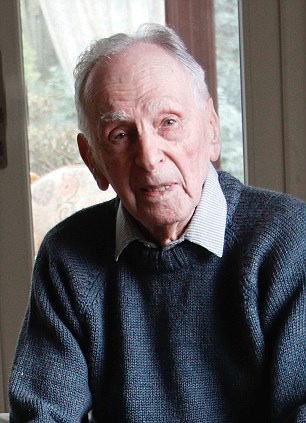
Making history: Eric Brown (pictured at home in Copthorne, Sussex) has flown more aircraft than anyone else in history, and was the first man to fly a jet on and off an aircraft carrier
Eric Brown must rank as the most extraordinary airman alive. Indeed, open his memoirs at any page and you are left asking a single question: how on earth did this modest Scotsman live to tell the tale?
But Captain Eric ‘Winkle’ Brown RN is very much alive and in sparkling form as he pours me a glass of sherry at his West Sussex home and reflects on an astonishing life. This is the man who has flown more aircraft than anyone else in history.
He was the first man to fly a jet on and off an aircraft carrier. He has set aviation records that will almost certainly never be broken and is revered as one of the greatest test pilots of all time.
But even if you take out the aerobatics, his story is remarkable. Here is a man who narrowly cheated death in the wreckage of a torpedoed ship, helped to liberate Belsen and took 2,000 enemy prisoners armed only with a pistol.
In the immediate aftermath of the war, Eric had to interrogate a bewildering cross-section of leading Nazis, including Hermann Goering, as well as plane manufacturer Enrst Heinkel and designer Willie Messerchmitt.
What’s more, he then had to test all their aircraft. And all this before turning 30. Little wonder that when he arrived at Buckingham Palace at the grand old age of 28 for the fourth time, to receive the AFC in addition to the DSC, MBE and OBE he had already received, George VI greeted him with the words: ‘Not you again.’
In fact, young Brown would soon be back once more to receive the King’s Commendation for Brave Conduct.
Years later, he would end up as an aide-de-camp to the Queen, who would add a CBE to his collection in 1970
Pin-sharp at 94, Eric is in constant demand from historians and documentary makers, while his autobiography, Wings On My Sleeve, is a must-read for any self-respecting aviator.
Now he is about to tell all as one of the star speakers at next month’s Daily Mail-sponsored Chalke Valley History Festival.
What’s more, his appearance on the last weekend in June will coincide with the Chalke Valley History Festival Airshow — one of this summer’s most spectacular, featuring replica dogfights from both World Wars. It will certainly bring back memories for Eric, whose flying career was shaped by these conflicts.
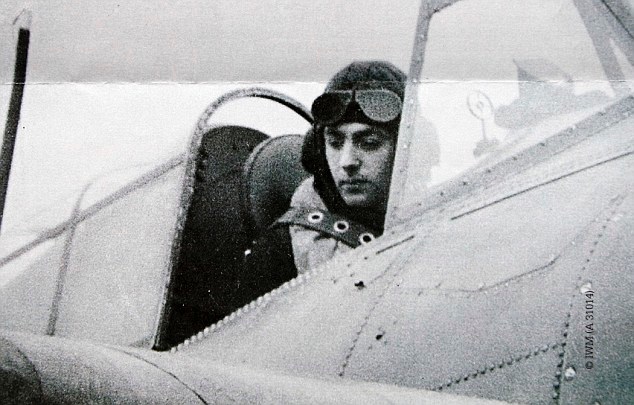
When Brown arrived at Buckingham Palace at the age of 28 for the fourth time, to receive the AFC in addition to the DSC, MBE and OBE he had already received, George VI greeted him with the words: 'Not you again'
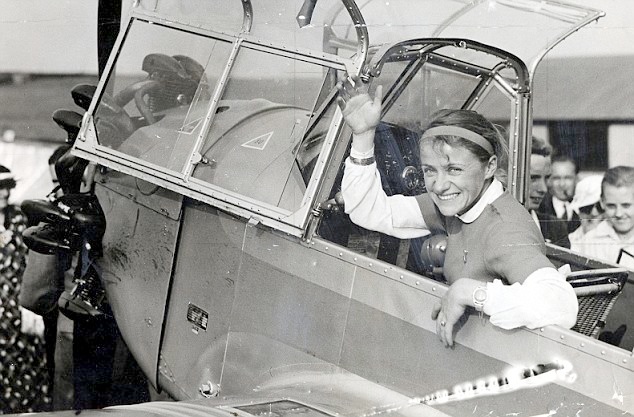
Brown was introduced to some of the leading lights of the Luftwaffe - including their formidable test pilot Hanna Reitsch (pictured) - having no inkling that, within a couple of years, they would be his sworn enemy
Eric’s father had served in the Royal Flying Corps during the Great War and, along with all former RFC pilots, received an invitation from the newly formed German Luftwaffe to visit the 1936 Olympics.
A promising scholar at Edinburgh’s Royal High School, Eric had recently lost his mother, so his father decided to take the boy to Germany to see the Games.
Among those hosting the RFC delegation was the charismatic Great War ace Ernst Udet, who had become a famous stunt pilot. He took up Eric for a spin — ‘Terrifying stuff’ — and the teenager was hooked.
‘When we landed, Udet gave me the old fighter pilot’s greeting — “Hals und Beinbruch!” [Break your neck and leg] — and told me to learn to fly.’
Eric went on to Edinburgh University, where he studied German and joined the university’s air squadron. During a student trip to Germany, he wrote to Udet, by then a senior Luftwaffe general, who invited Eric into his social circle. The wide-eyed student was introduced to some of the leading lights of the Luftwaffe — including their formidable test pilot and world gliding champion Hanna Reitsch — having no inkling that, within a couple of years, they would be his sworn enemy.
CHALKE VALLEY FESTIVAL, WHERE HISTORY COME ALIVES
Captain Eric 'Winkle' Brown will be talking about his extraordinary career at the Daily Mail Chalke Valley History Festival on Saturday, June 29, at 3.45pm.
The festival is a unique combination of a literary festival, historical reconstructions and a schools' education programme that offers something for all ages.

Speakers include Max Hastings, Ian Hislop, Paddy Ashdown, Antony Beevor, Boris Johnson, Artemis Cooper, Simon Sebag Montefiore and Dan Snow, who will answer audience questions.
The festival runs from June 24 to 30 at Ebbesbourne Wake, near Salisbury. To book an event or find out more information, visit cvhf.org.uk or tel: 01722 781133
‘Udet was like a schoolboy who regarded the whole world as a friend,’ says Eric. ‘He had these riotous evenings at his flat in Berlin. One of his party tricks was a shooting game where you had to fire a pistol at a target behind you, using a mirror. It made a mess of the wall, but he was very good at it.
‘I often wondered what the neighbours thought — but I suppose you didn’t complain if your neighbour was a Nazi general.’
In 1939, having recently arrived in Germany on a teaching exchange, Eric received a knock on the door one morning. ‘Our countries are at war,’ said an SS officer, before taking away Eric for interrogation.
Fearing the worst, he was pleasantly surprised to be dumped at the Swiss border, from where he made his way home as fast as possible to sign up with the RAF.
Like all young pilots, Eric was itching to get airborne and was frustrated by the lack of RAF planes and postings. But there were plenty of vacancies for pilots in the Royal Navy following the loss of the aircraft carrier, HMS Courageous, with more than 500 men, in the opening weeks of the war.
So Eric transferred to the Fleet Air Arm — where he was nicknamed ‘Winkle’ — and retrained as a naval pilot. Before long he was on HMS Audacity, an aircraft carrier escorting vital convoys between Britain and Gibraltar.
His bravery in his Martlet fighter soon earned him the Distinguished Service Cross.
Then, in December 1941, his ship was torpedoed and sank 450 miles off Cape Finisterre. He was one of the few survivors after floating in the water for several hours.
‘I couldn’t walk for a week, but I was lucky,’ he said. ‘As pilots, we had proper lifejackets.’
Back home, his exceptional flying skills had been spotted and he was transferred to special duties as a test pilot. Among his tasks was working out ways of flying Spitfires, Hurricanes and Mosquitoes on and off ships, vastly improving the clout of the Fleet Air Arm.
And when he wasn’t testing the boffins’ latest theories, he was also charged with training a gung-ho band of Canadian Spitfire pilots with whom he saw regular action over France.
By 1944, Eric had moved to the top secret Aerodynamics Flight based at Farnborough.
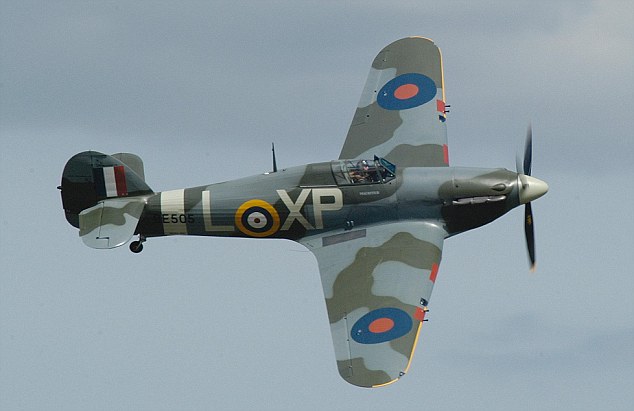
Eric was transferred to special duties as a test pilot. Among his tasks was working out ways of flying Spitfires, Hurricanes and Mosquitoes on and off ships, vastly improving the clout of the Fleet Air Arm. Pictured is a Hurricane IIB
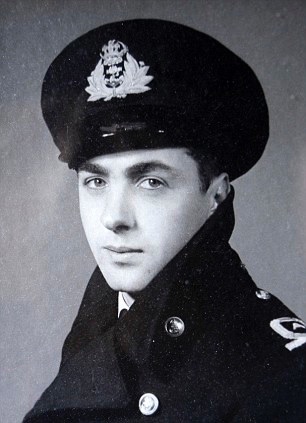
By 1944, Eric had moved to the top secret Aerodynamics Flight based at Farnborough
Winston Churchill needed a solution to the Nazis’ unmanned V1 rocket bombs, which were terrifying the civilian population.
One OF the first had reduced Eric’s home, near Aldershot, to rubble. ‘My wife was injured, our cleaning lady lost an eye and the dogs disappeared, so my interest was personal,’ he says.
Eric helped develop a booster system that could get a fighter alongside a V1 for a short spurt and tip it off-course without colliding.
‘You couldn’t blow it up because you’d fly straight into the debris — but there was a way of nudging its wings using air pressure and not actually touching.’
It led to Eric’s first — and last — bail-out. ‘One day, the engine caught fire and my feet were starting to fry, so it was time to go over the side,’ he says, matter-of-factly.
‘I landed in a pond in a field with this very angry bull in it. Every time I tried to get out of the water, it came at me — and the ambulance and the Home Guard wouldn’t go near it. I shouted at them to get the farmer. I remember him leading it away, saying: “Come on, Ferdinand.”’
As the Allies progressed through Italy and France, Eric became commanding officer of a very exotic unit — Farnborough’s Enemy Aircraft Flight. His task was to capture and evaluate as much Nazi hardware as he could find.
One of the most unappealing was a Messerschmitt 163 — a rocket plane that ran on liquid explosive.
Dozens of German pilots had been killed developing the thing, but Eric still chuckles as he recalls his maiden flight: ‘I soon worked out that the only way to land it without exploding was to run out of fuel first, so you had to get your timings right.’
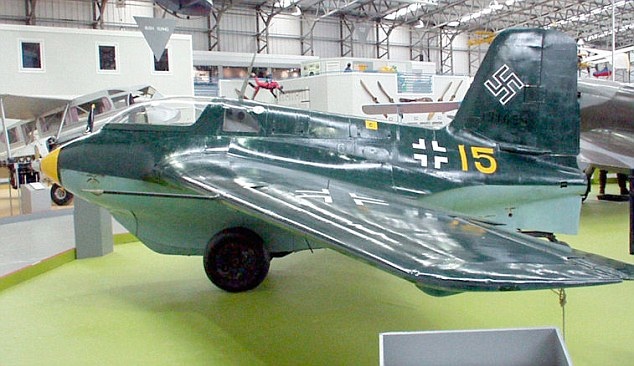
As commanding officer of Farnborough's Enemy Aircraft Flight, Eric had to capture Nazi hardware. One of the most unappealing was a Messerschmitt 163 - a rocket plane that ran on liquid explosive (pictured)

Eric has never forgotten the sights he encountered nor the remorselessness of the female commandant he interrogated, Irma Grese. 'She was the worst human being I ever encountered,' he says
In 1945, landing at a newly captured airstrip in Germany, he met Allied troops investigating rumours of a concentration camp at Belsen.
Realising that Eric had better German than his interpreter, the brigadier in charge asked him along to assist with translation.
Eric has never forgotten the sights he encountered nor the remorselessness of the female commandant he interrogated, Irma Grese.
‘She was the worst human being I ever encountered,’ he says. She was hanged a few days later.
Soon afterwards, Eric flew in to another air base in Denmark, only to discover the Allies had yet to capture it.
‘I was in this little Avro Anson and there were still 2,000 enemy troops there,’ he says.
‘I thought we were for it as we landed, but the commanding officer came up to me, handed me his sword and surrendered on the spot.’
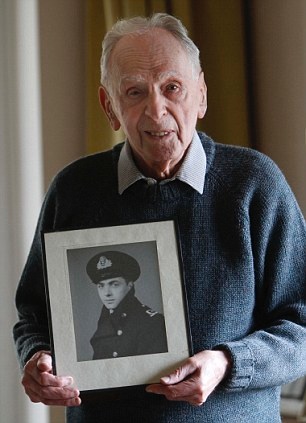
'Only doing the job': Among his many records is one for the most aircraft carrier landings in history: 2,407. A U.S. naval pilot who tried to beat him got as far as 1,600 before suffering a nervous breakdown
Given his excellent knowledge of German and aeroplanes, Eric interrogated all the enemy top brass. He did not warm to Willie Messerschmitt. ‘We had a bit of a to-do,’ says Eric, with mischievous understatement.
‘I accused him of compromising the integrity of his planes because the wings on some had started falling off. He bridled at that!’
Dr Ernst Heinkel was a ‘funny little man’. Eric’s erstwhile mentor, Udet, had committed suicide in 1941, but one day Winkle found himself in an interview room with Hanna Reitsch, still an unrepentant Hitler worshipper.
‘She was emotional because she had just heard that her father had shot all the women in the family and then himself to spare them from the Russians. So she told me quite a lot.’
He even interviewed Hermann Goering. ‘His uniform was falling off him, but he perked up when I told him he was going to be interviewed by a pilot. He answered all my questions.
‘The first thing I asked was his opinion on the outcome of the Battle of Britain and he said: “A draw.” He said they had not been defeated, but that Hitler had ordered the withdrawal of fighter units to concentrate on Russia.’
After the war, Eric worked with Sir Frank Whittle, the inventor of the jet engine, clocking up numerous life-threatening ‘firsts’ in the field of jet aviation.
Among his unappetising tasks was discovering why certain aircraft would crash at certain speeds, and why planes had a habit of disappearing in storms.
Among his many records is one for the most aircraft carrier landings in history: 2,407. A U.S. naval pilot who tried to beat him got as far as 1,600 before suffering a nervous breakdown.
It is also highly unlikely that anyone will surpass Eric’s world record for flying 487 different types of aeroplane.
A proud grandfather and great-grandfather, he is typical of his generation in insisting that he was ‘only doing the job’.
But Eric Brown did not merely witness history: he made it, too. And it is a hell of a story.